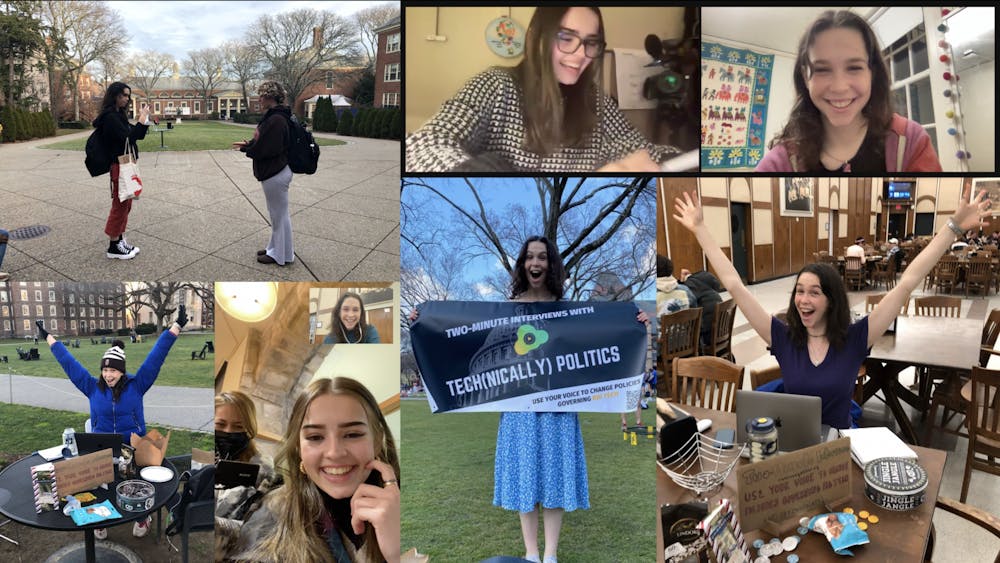A first-year at the University has brought “Tech(nically) Politics,” a national movement created to leverage youth voices to push for greater legislative action on tech regulation, to campus.
According to the organization’s website, “Tech(nically) Politics,” co-founded by Aliza Kopans ’25, aims to collect video and audio testimonials from young people across the country about their personal experiences with online platforms. The organization compiles and sends these testimonials to lawmakers from the local to federal level with the hope of inciting legislative change.
While statistics have shown that social media leads to adverse mental health effects, the numbers still don’t tell the full story, Kopans said.
“You can look at the stats and you can talk to the experts and see all of these numbers, but it can be really hard to internalize that … there are human beings behind these (statistics),” Kopans said.
So far, Kopans said she has interviewed over 60 people on campus and in her hometown of Arlington, Massachusetts, noting that “everyone has something to say.”
Max Karpawich ’23, a former member of the Herald’s Bruno Brief team and one of Kopans’s on-campus interviewees, wrote in an email to The Herald that he shares her passion for regulating big tech.
“Our digital experiences today are defined by just a few devices, platforms and apps built and maintained by a handful of American corporations,” he wrote. “Each corporation makes some or all of its profits by facilitating the extraction of human attention.”
Kopans said her passion for social media regulation stems, in part, from her own experiences. Growing up, her parents were intentional about limiting her and her sister’s access to technology, and although she was active on social media in middle school, the mental consequences of her involvement on Instagram led her to delete social media.
“Constant exposure to comparison culture on this app that’s designed to be addictive really exacerbated the difficulties of middle school and being an adolescent,” she said.
The idea for the movement, which Kopans founded last year alongside Emma Lembke, now a first-year at Washington University in St. Louis, partially stemmed from the conversations they had while working with the Center for Humane Technology, an organization working to reshape the nature of digital infrastructure, Kopans said.
Kopans and Lembke also shared a common goal of amplifying young voices.
“We started talking about how we feel like there’s such a deficit of youth voices in the regulatory space,” Kopans said. “Here are these lawmakers who are 50-60 years old … making laws to regulate and govern big tech, but they didn’t grow up feeling the effects of technology.”
“It would be such a missed opportunity as these laws are being created and implemented to not turn to the young people who have grown up in tandem with the growth of digital tech and really know what we want to see change,” she added.
Jean Rogers, the director of the Screen Time Action Network at Fairplay, who worked with Kopans during her time as a youth advisory board member at the organization, echoed Kopans’ concerns regarding the dangers of technology for youth.
“We need privacy regulations so that all of our information, especially our young people’s information, is not being used for these companies to profit,” Rogers said. “Big tech companies are putting profit over mental wellness and the futures of our young people.”
While Kopans and Lembke created the Tech(nically) Politics website less than a year ago, the movement has already gained momentum.
According to Kopans, a documentary producer has already filmed her, focusing both on her life as a Brown student and the work she's been doing to expand the reach of the moment.
Earlier this year, Lembke also spoke on an episode of “St. Louis on the Air” on St. Louis Public Radio about her work on “Tech(nically) Politics.”
Additionally, Kopans said the group has already garnered grant funding from LookUp.Live, an organization which, according to their website, seeks to “discover, empower, and mobilize youth leaders who are taking action to raise awareness, inspire and design a healthy, more inclusive and responsible digital world.”
Moving forward, Kopans explained that Tech(nically) Politics has big plans for expansion.
Recently, Kopans met virtually with Frances Haugen — a whistleblower who leaked tens of thousands of documents from inside Facebook about the company stalling efforts to combat misinformation and internal efforts to research the effects of their platforms on children and teenagers. Kopans also plans to meet with “Accountable Tech,” another organization focused on reforming social media in Washington, D.C., and mentioned the possibility of establishing chapters of Tech(nically) Politics at other colleges.
“It’s just so exciting … even if we don’t achieve our ultimate goal and mission of changing the laws that are governing tech, hopefully we’re opening up a space for so many young people to start thinking critically about their relationship with technology and join in the advocacy,” Kopans said.
In reflecting on what he hopes Tech(nically) Politics will accomplish, Karpawich wrote that he “hopes that Tech(nically) Politics shows American policymakers just how dangerous our current digital spaces are not only for our democracy, but for our individual mental health and well-being.”
“Future generations of Americans will be more online,” he added. “We need to take greater care in how we design our digital experiences if we want to protect the well-being of America moving forward.”

Aniyah Nelson is a university news editor overseeing the undergraduate student life beat. She is a senior from Cleveland, OH concentrating in political science and sociology. In her free time, she enjoys listening to music and watching bloopers from The Office.





